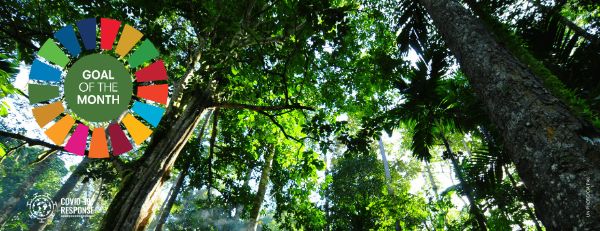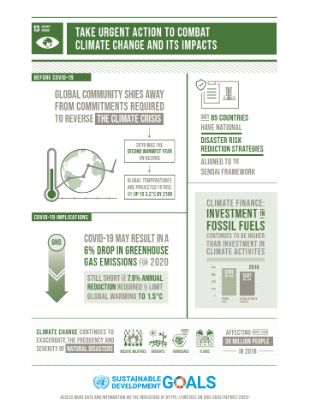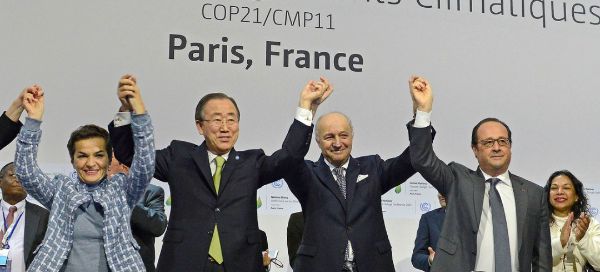
"The world has a high fever and is burning up. Climate disruption is daily news – from devastating wildfires to record floods. The damage to people and the environment is immense and growing."
- UN Secretary-General António Guterres
Just today PM Jacinda Ardern's Government has declared a Climate Emergency. However, it is unclear what this will mean in terms of real action being taken to address the issue.
Over December Scoop will be publishing stories on how NZ and the world can meet the UN's Sustainable Development Goal 13 - Climate Action.
Climate science is clear – greenhouse gas concentrations, which are already at their highest levels in 3 million years, have continued to rise, even despite economic slowdowns caused by COVID-19. Temperatures are in record-breaking territory, polar ice is retreating, and sea level is rising.
Now is the time for bold action to address the climate emergency and recover sustainably from the pandemic. Shifting to a green economy could yield a direct economic gain of at least US$26 trillion through to 2030 compared to business-as-usual. With renewable energy, we can generate three times more jobs than compared to fossil fuels – that could mean about 9 million jobs annually in the next three years.
As the world looks to recover and rebuild from the COVID-19 pandemic, there is growing global recognition that the catalyst for transformational change is investment in a green and sustainable global economy that produces jobs, reduces emissions, and builds resilience to climate impacts.
In December, we will be highlighting Sustainable Development Goal 13 – Climate Action – as we mark the fifth anniversary of the landmark Paris Agreement on Climate Change, and an end to an unprecedented year with an ambition to recover better, stronger and healthier.
Today we have published a number of stories giving more context about the issue. These include the following:
- Everything you need to know about the Paris Agreement.
- Why Goal 13 Matters
- Infographic

PARIS AGREEMENT AT FIVE

In 2015, the world came together in Paris to agree on a pact to keep global temperature increase well below 2°C above pre-industrial levels and to pursue efforts to limit the temperature increase even further to 1.5°C. The agreement meant a significant reduction in greenhouse gas emission.
In the last five years, we have seen increasing support for climate action. A growing number of countries have pledged carbon neutrality by 2050. Early next year, countries representing more than 65 percent of global carbon emissions will have made ambitious commitments to carbon neutrality.
People are playing their part everyday too – from driving less, to eating more plant-based meals and upcycling old clothes. ActNow, the UN campaign that encourages individual action on climate change and sustainability, has now registered over a million actions – an unprecedented show of support that proves that we are all in this together.
But we are still running behind in the race against time until every country, city, financial institution and company adopts plans for transitioning to net zero emissions, says UN Secretary-General António Guterres, calling for more ambitious national climate plans.
More here.
The race to net zero emissions, and why the world depends on it

UN News looks at the importance of reaching zero emissions and seizing the post-COVID-19 opportunity to promote renewable energy investments, smart buildings, green and public transport, and a whole range of other interventions that will help to slow climate change.
We will be following up with more detail on climate change throughout the month and how the government can achieve their commitment to the UN sustainability goals.



 Binoy Kampmark: Bratty Royal - Prince Harry And Bespoke Security Protection
Binoy Kampmark: Bratty Royal - Prince Harry And Bespoke Security Protection Keith Rankin: Make Deficits Great Again - Maintaining A Pragmatic Balance
Keith Rankin: Make Deficits Great Again - Maintaining A Pragmatic Balance Richard S. Ehrlich: China's Great Wall & Egypt's Pyramids
Richard S. Ehrlich: China's Great Wall & Egypt's Pyramids Gordon Campbell: On Surviving Trump’s Trip To La La Land
Gordon Campbell: On Surviving Trump’s Trip To La La Land Ramzy Baroud: Famine In Gaza - Will We Continue To Watch As Gaza Starves To Death?
Ramzy Baroud: Famine In Gaza - Will We Continue To Watch As Gaza Starves To Death? Peter Dunne: Dunne's Weekly - A Government Backbencher's Lot Not Always A Happy One
Peter Dunne: Dunne's Weekly - A Government Backbencher's Lot Not Always A Happy One